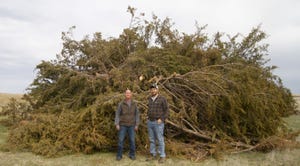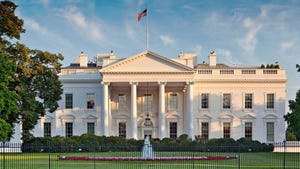Packers Effect On Pricing Not Big
Stephen Koontz probably didn't make any new friends, but he sure may have influenced a few people.Koontz, an agricultural economist at Colorado State University, teamed with Clem Ward, a counterpart at Oklahoma State University, to study the impact of consolidation in the meatpacking industry and its effect on cattle pricing. For years, there have been those who would swear on their deathbed that the big meatpackers are responsible for keeping cattle prices down.
March 26, 2010

Stephen Koontz probably didn't make any new friends, but he sure may have influenced a few people.
Koontz, an agricultural economist at Colorado State University, teamed with Clem Ward, a counterpart at Oklahoma State University, to study the impact of consolidation in the meatpacking industry and its effect on cattle pricing. For years, there have been those who would swear on their deathbed that the big meatpackers are responsible for keeping cattle prices down.
But that isn't the case, according to the 20 years of academic research conducted by the two economists. Those studies concluded, Koontz said, that while market power is present among the packers, it has been measured and, he pointed out, it's not all that big.
Koontz released his findings for the first time at a recent meeting of the National Cattlemen's Beef Association Live Cattle Marking Committee in San Antonio.
“What I really tried to point out is what we found was based on science and if you want to disagree with me, fine, but go look at the scientific facts first,” Koontz said.
Koontz has been invited by the NCBA to present his findings at a joint U.S. Department of Justice/U.S. Department of Agriculture meeting in Fort Collins later this year. That is one of a series of meetings scheduled by the Justice Department focusing on issues facing crop farmers. The meeting in Fort Collins, on Aug. 26, will feature a panel discussion on concentration in the livestock sector.
The Justice Department said it has received more than 15,000 comments from farmers, consumers, academics, elected officials and industry organizations in advance of the sessions. The Justice Department has rattled its sword on many occasion threatening antitrust legislation to stop, or at least limit, consolidation of the meatpacking industry.
But Koontz said his research shows aggressive antitrust legislation is not needed and it does not indicate there's anything that's broken that needs fixing.
“I'm sure we will see some form of antitrust, but that will not put more money in the pockets of the cow-calf operator, the feeder or the packer,” Koontz said. “This isn't like the ‘30s when Standard Oil was running away with a bunch of money and hiding it somewhere.”
Koontz told the NCBA meeting there was an “overwhelming” amount of economic evidence that revealed the biggest beef packing companies are able to realize lower costs through economies of scale, which far outweigh concerns about market power. The cattle industry, he said, has actually benefited from the big packers and that has actually resulted in higher fed cattle prices, as well as higher calf prices.
-- Bill Jackson, Greely Tribune www.greeleytribune.com
You May Also Like
.png?width=300&auto=webp&quality=80&disable=upscale)


